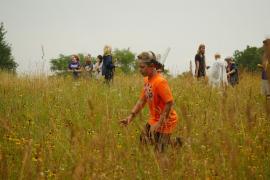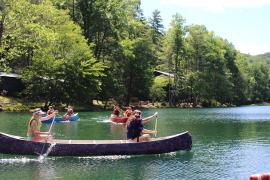Working at camp can be a blast and a great opportunity to make lifelong friends while learning skills useful to life beyond camp. Although a great deal of camp research has focused on understanding the benefits of attending camp for youth participants, we know less about what this experience is like for the staff who make the programs happen. Do not fear! Research about seasonal summer camp staff experiences does exist (see Warner et al., 2021 for a review) and more is on the way!
What We’re Learning
- Camp can be a complementary setting for young people’s development. In a recent study (Povilaitis et al., 2021), we looked at how the things first-year staff learned at camp compared to what they learned in school and non-camp work. We found that camp employment can be a great setting for young adults to learn relationship skills, leadership, and appreciation for being present in the moment compared to other settings throughout their lives. Our findings suggest that camp employment can be a fertile setting for development that complements learning in school and non-camp work.
- Working at camp is meaningful work. In a recent study (for abstract, see Warner et al., 2020, p. 124, full article in press), we wanted to know if camp staff viewed their work at camp as meaningful work, and if so, what about the work experience made it meaningful. Across two groups of staff (first-year and returning staff), we found that young adults think of camp employment as meaningful and that it was meaningful because they could see the impact they were having on youth, their meaningful relationships with coworkers, and opportunities for personal development. We also found that working at camp was more meaningful than non-camp summer work. Finding meaningful work is important to young adults’ career development and our findings suggest that camp can be a great place for young adults to experience it!
- Camp employment can contribute to young adults’ career development. In a recent study (Warner & Povilaitis, 2021, p. 63), we wanted to know how working at camp shaped young adults’ work values — or what they desired in their future work. Through interviews with 76 participants who had worked at a summer camp for at least one summer, we found that camp employment was influential in shaping young adults’ work values. We found that the unique characteristics of camp employment (i.e., social setting, impactful work, live-where-you-work, variety) helped young adults’ understand their desires for doing work that makes a difference, that has a supportive work environment and offers opportunities for meaningful relationships with coworkers, work-life balance, personal development, and variety. Our findings suggest that camp employment can be a setting that nurtures young adults’ career development.
- First-year staff return to camp because it’s engaging and they feel like they belong. In a recent study (Warner & Sibthorp, 2021, p. 67), we wanted to know what about staff’s experiences working at camp their first summer were related to their return to the same camp for a second summer of work. We found that staff that were highly engaged and felt like they belonged were nearly three times and two times more likely to have returned, respectively. We also found that staff who did not return to camp for a second summer did not return due to pay, different work, and educational opportunities. By looking at staff’s experiences their first summer and their actual return to camp, our findings suggest that creating engaging experiences for first-year staff and helping them feel like they belong can be critical to getting them to come back for a second summer.
What It Means for Camps
- Help staff recognize they are learning skills. If you have regular staff meetings, ask staff members to identify what they learned that week and share their responses with others. Don’t be afraid to ask for clarification and to prompt staff to think more deeply about their responses. For example, if a staff member comments that they learned how to instruct campers in a new version of GaGa, help them identify the skill they learned in this activity (e.g., public speaking, leadership, creativity). When staff hear what skills their peers are learning, they might be more likely to be able to identify what they personally are learning as well.
- Learning and development at camp applies to life beyond camp. Taking this concept of learning skills one step further, ask staff how their newly learned skills will impact them in life outside of camp. For example, in an exit survey or journal reflection, encourage staff to think about how they will use these skills in other areas of their lives. You can also prompt them to reflect on certain contexts (e.g., college, other work, personal relationships) or certain groups of skills, such as social emotional learning skills (e.g., communication, respect, empathy) or career-related skills (e.g., organization, time management, problem-solving). Similarly, you could help staff think about what parts of the camp job they liked and would want in future jobs and careers. For example, if a staff member enjoyed the variety of work and active aspect of their camp job, a desk job might be difficult for them in the future. Alternatively, if they enjoyed how they were able to see the meaningfulness of their work and the direct impact they had on campers, this staff member might want to seek out jobs where they can see their impact.
- Encourage staff to return. Camp directors recognize that sometimes staff need to move on to different summer experiences like internships or study abroad programs. Other staff might benefit from another summer working at camp. To help encourage staff to return to work at camp, think of ways to increase staff member’s feelings of engagement and sense of belonging. Engagement occurs when staff are immersed in and enjoy the work they are doing. This often occurs with a role change (e.g., arts and crafts counselor becoming a theatre counselor) or added responsibilities (e.g., overseeing other junior staff members). In addition, always think of how you can increase feelings of belonging among staff, whether that be through group bonding events, one-on-one check-ins, or creating a multicultural work environment that recognizes and celebrates the unique backgrounds of staff. Given that the summer camp industry at-large is working to become more inclusive and equitable, culturally responsive and sustaining methods may be a useful way to support staff from a diversity of backgrounds and life experiences so they feel recognized and valued. Helping staff feel connected and valued can go a long way in motivating them to return.
The National Staff Impact Study continues through 2021, so stay tuned for more staff-based research to come!
This blog was written on behalf of Project Real Job’s efforts to help camps recruit, hire, and retain staff.
Photo courtesy of Oak Hill School Summer Programs in Eugene, Oregon
References
Povilaitis, V., Sibthorp, J., & Richmond, D. (2021). Camp employment as a developmental setting for emerging adults: A national mixed-methods study. Journal of Outdoor, Recreation, Education, and Leadership, 13(1), 64-81. doi.org/10.18666/JOREL-2021-V13-I1-10545
Warner, R. P., Godwin, M., & Hodge, C. J. (2021). Seasonal summer camp staff experiences: A scoping review. Journal of Outdoor, Recreation, Education, and Leadership, 13(1), 40-63. doi.org/10.18666/JOREL-V13-I1-10535
Warner, R. P., Povilaitis, V., & Sibthorp, J. (2020). Emerging adults’ perceptions of summer camp as meaningful work. American Camp Association Research Forum Book of Abstracts 2020, 124-127. ACAcamps.org/sites/default/files/resource_library/2020-Camp-Research-Forum-Book-Abstracts.pdf
Warner, R. P. & Povilaitis, V. (2021). Beyond fun and skill development: How seasonal summer camp work impacts emerging adults’ work values. American Camp Association Research Forum Book of Abstracts 2021, 63-66. ACAcamps.org/sites/default/files/resource_library/2021-Camp-Research-Forum-Book-Abstracts.pdf
Warner, R. P. & Sibthorp, J. (2021). Why first-year summer camp staff return and do not return to work at camp. American Camp Association Research Forum Book of Abstracts 2021, 67-70. ACAcamps.org/sites/default/files/resource_library/2021-Camp-Research-Forum-Book-Abstracts.pdf
Robert P. Warner, University of Utah: Robert is a PhD candidate at the University of Utah. He works as a research assistant on projects related to positive youth development through out-of-school time settings, like summer camp and outdoor adventure education. Through his scholarship he seeks to better understand the role of youth recreation experiences and seasonal employment experiences in broader developmental outcomes, as well as increase equitable developmental opportunities for people from a diversity of backgrounds.
Victoria Povilaitis, American Camp Association: Victoria recently completed her PhD at the University of Utah and now works at ACA as a Research Associate. She is a long-time summer camp program director and staffing director. Through her academic work she aims to bridge research and practice and hopes to develop tools and strategies that camp professionals can use when working with campers and staff to facilitate positive experiences for everyone who engages with camp.
The views and opinions expressed by contributors are their own and do not necessarily reflect the views of the American Camp Association or ACA employees.




